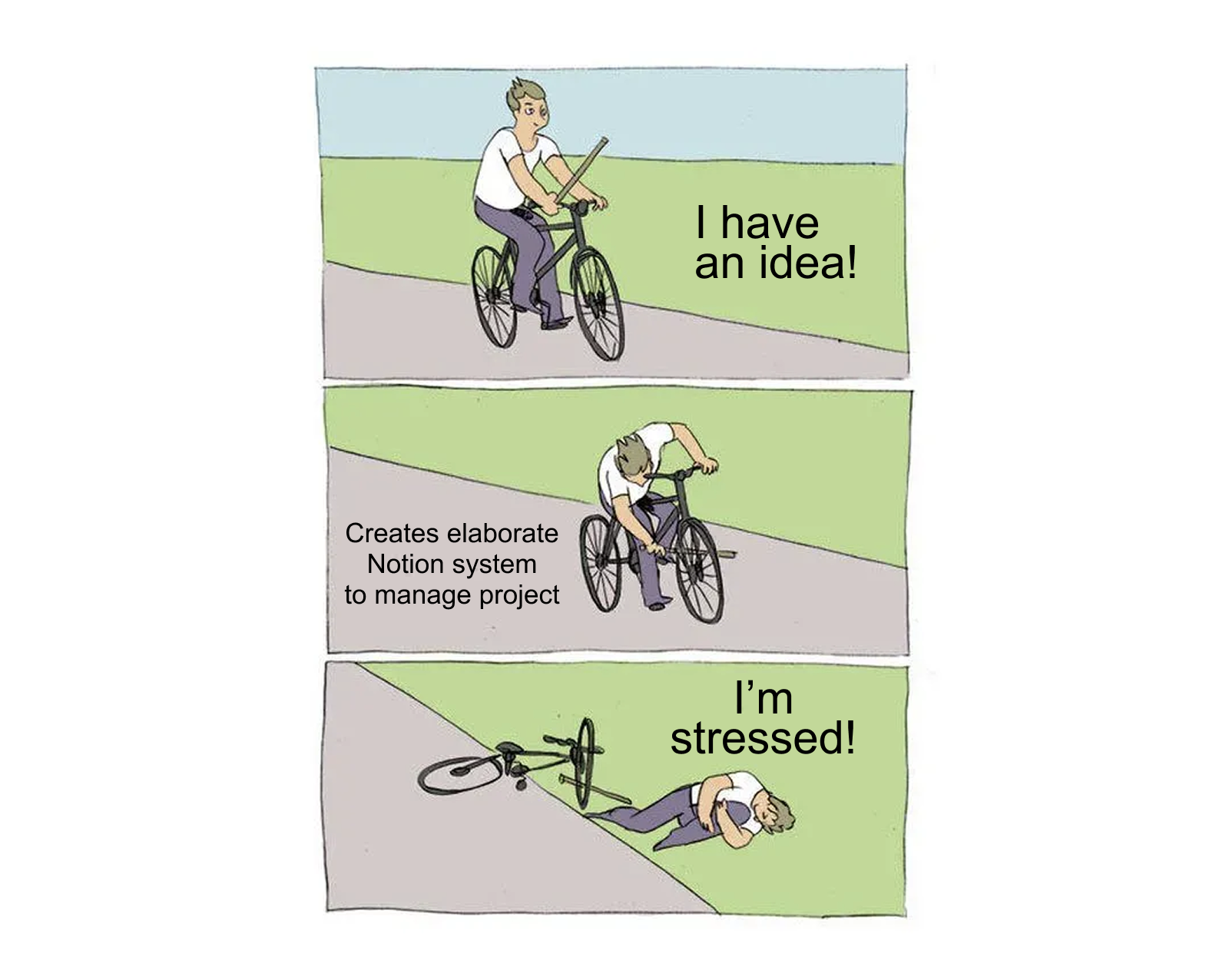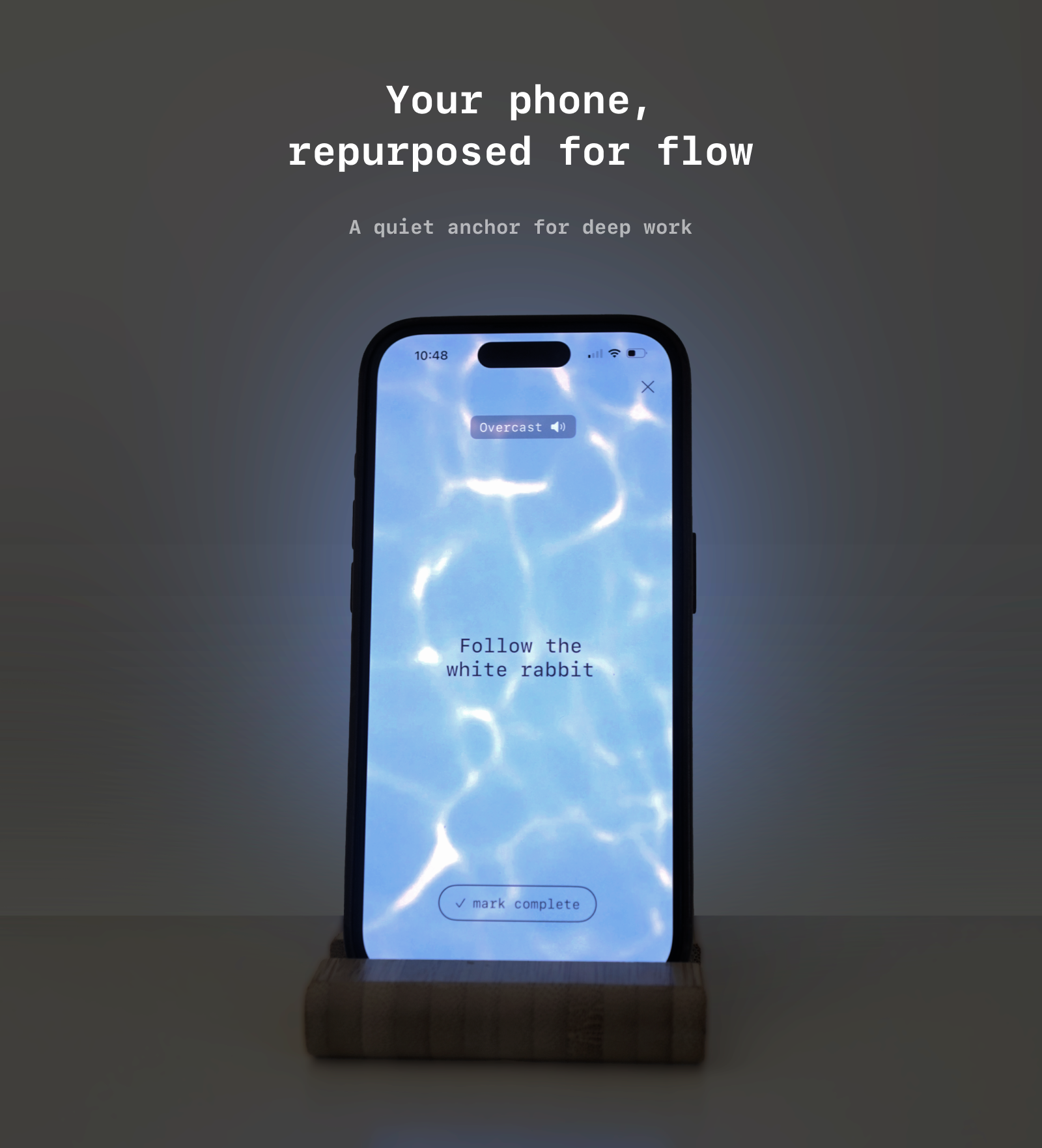
I was drowning in options.
Every productivity app promised salvation.
Every system swore it would transform my chaotic mind into a precision instrument.
And I believed them all.
I'd spend hours configuring the perfect setup.
Color-coding tasks.
Creating nested categories.
Building intricate workflows that would make a German engineer weep with joy.
Then I'd complete exactly zero actual tasks.
Sound familiar?
I wasn't solving my productivity problem.
I was feeding my productivity addiction.
The midwit's dilemma
Here's the uncomfortable truth I had to face:
I am a midwit.
Smart enough to build complex systems.
Dumb enough to believe those systems would save me.
Give a midwit organizing tools, and they will organize until the heat death of the universe.
Give them planning capabilities, and they'll plan their way into a beautiful, color-coded oblivion.
All while producing nothing of value.
I needed an intervention.
Not another app.
Not another system.
I needed something that would stop me from being... me.
The breaking point
I had another "great" idea. This was THE ONE!
Two weeks later, I had:
- Three different project management boards (don't ask... It started as one but exploded)
- A 10-page document outlining funnels and content marketing strategy
- 3 rough drafts of a marketing site
- A calendar with development milestones mapped out for the next three months
What I didn't have? A single minute of actual work completed.
By the end of my meticulous planning phase, I had actually talked myself out of starting altogether. "Too complicated," I concluded, staring at the elaborate maze I'd designed.
Who was I planning for? It's just me here. No team to direct. No one to impress. No one to please.
In reality, I could have launched an MVP during those two weeks if I had just gotten out of my own way.
That's when it hit me.
The perfect productivity system is the one that gets you to the actual work faster.
I needed something ruthlessly simple.
Something that would make planning impossible and doing inevitable.
Something that would save me from my own midwit tendencies.
So I built monkwit.
What monkwit is (and isn't)
monkwit isn't impressive.
It isn't feature-rich.
It isn't customizable.
It isn't a calendar app with color-coded time blocks that make you feel productive while accomplishing nothing.
It isn't an endless maze of tags, categories, and priority fields.
It isn't something you need to "set up" before you can start working.
And that's exactly the point.
monkwit is:
A focus ritual that trains my brain
Same sound. Same visual. Same routine.
My brain now knows: when monkwit opens, we work. No negotiations.
No different than Pavlov's dogs, except I'm both the scientist and the subject.
Freedom from arbitrary time blocks
I like the simplicity of Pomodoro apps that put one focus item on the screen.
I hate feeling locked into 25-minute cycles.
Sometimes I want to work for two hours straight.
Sometimes 20 minutes is my limit.
And if I need to take a piss break, I don't want to pause a damn timer like I'm asking permission from my own app.
monkwit doesn't care how long you work. It only cares that you're working.
A simple list I can reorder without temptation
Notes apps work great for lists, but they're not drag-and-drop for proper prioritization.
Task managers let you reorder, but they also tempt you to tag, categorize, and prioritize until you've wasted an hour "organizing" three simple tasks.
monkwit lets you create a list. You can reorder it. That's it.
No categories to create. No fields to fill. No rabbit holes to fall down.
ZERO setup time
This was non-negotiable.
If I have a new project, I don't want the ability to "set it up" and "organize it."
Because I will.
And it's a waste of time.
With monkwit, you write tasks and you do the tasks.
The end.
Present-focused, not future-obsessed
I used to live off my calendar (or attempt to) with strict time-blocked sections I'd meticulously plan a week in advance.
I rarely followed them.
My calendar became so cluttered with color-coded productivity hopes that I stopped looking at it altogether. The result? I missed actual appointments that required my presence.
With monkwit, there are no notifications telling you what you "should" be doing at 2:15 PM on Thursday. No option to block out your day in 30-minute increments of aspirational productivity.
monkwit is about being present. It's about what you are doing NOW.
Nothing else matters.
The uncomfortable truth about productivity
Most productivity tools aren't designed for productivity.
They're designed for the illusion of productivity.
They're built for people who want to feel like they're making progress without the discomfort of actual work.
They're built for midwits like me.
We don't need more features.
We need fewer escape routes.
We don't need more ways to organize.
We need fewer ways to hide.
The real problem isn't organization
Your brain isn't a computer that needs the right software.
Your tasks aren't data points that need the right structure.
The real problem is emotional.
Fear of failure.
Fear of inadequacy.
Fear of facing the blank page, the empty canvas, the unsolved problem.
So we hide in preparation.
We convince ourselves we're "getting ready" when we're really just avoiding.
monkwit is my middle finger to that tendency.
It's not a tool for organizing work.
It's a tool for confronting the fear of doing it.
This isn't about perfection
monkwit isn't perfect.
It's missing features you might want.
It lacks customization you might crave.
That's by design.
Get to work.
(But also give me feedback so I can make it better 😂)
The only productivity advice that matters
Stop looking for the perfect system.
Stop waiting for the perfect tool.
Stop believing that organization equals accomplishment.
Start embracing the discomfort of actual work.
Start accepting that progress is messy.
Start understanding that productivity isn't about managing tasks—it's about managing yourself.
monkwit isn't for everyone.
It's for people who recognize their own tendency to hide in complexity.
It's for midwits who are tired of being midwits.
It's for anyone who's ready to stop planning and start doing.
Because at the end of the day, no one cares how organized your task list was.
They only care about what you actually created.
So close this article.
Pick one thing.
And go do it.
No system required.
